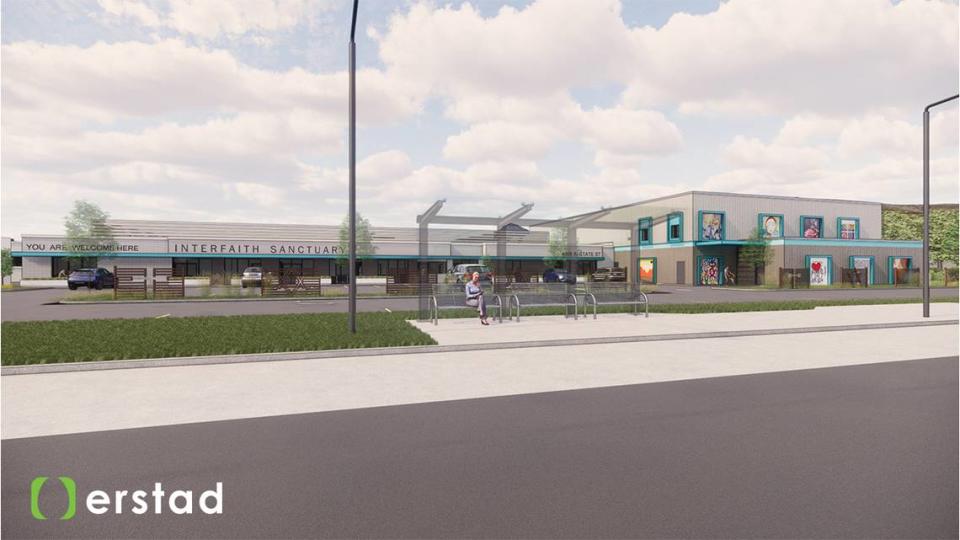Foes forced Boise council to reconsider a planned homeless shelter. What happened?
Neighbors of a proposed homeless shelter on State Street are keeping up their fight, worried that the new location will hurt their neighborhood. The controversy has not lacked for heated exchanges, and the latest Boise City Council meeting on the subject was no exception.
In a contentious and extended hearing, the City Council on Tuesday shot down a request from the Veterans ParkNeighborhood Association and a neighbor to again reconsider the council’s approval of Interfaith Sanctuary’s proposed shelter in a former Salvation Army thrift store.
The proposal has been mired in hearings and litigation for two years.
The council was forced to reconsider the shelter, which it approved in April 2022, because neighbors disliked changes made since, which were approved by the Design Review Committee in the fall and upheld by the Planning and Zoning Commission.
Opponents argued that the changes meant that Interfaith no longer met the extensive list of conditions the City Council had already imposed on the project and would have adverse effects on nearby homes. The changes include how guests would be brought into the shelter and how families would be separated from single adults.
In response, an attorney for the shelter argued that Interfaith was making changes that are needed if the shelter is to comply with the more than 30 conditions the city imposed.

Geoff Wardle, a Boise lawyer, said he was “flabbergasted” by the continued moves to oppose the shelter, which he said were attempts to “re-litigate” issues that had already been resolved.
“I take umbrage with the fact that our compliance with the 36 conditions of approval, which necessitated revisions, is somehow deemed to be dishonest, wrong, or unethical, or necessitates this going back to the beginning,” Wardle told the council on Tuesday.
He said complaints from neighbors were like “squeezing a balloon,” where design changes to allay one concern gave rise to another.
At the hearing, neighbors focused their complaints on the design of a fence surrounding the back of the property, which they said would not provide sufficient sound barriers. Katy Decker, the neighborhood association’s president, suggested walls would be better than fences.
Wardle said the shelter wanted to avoid creating a “carceral setting.” Carceral means prison-like.
‘The rug pulled out from under us’: Families forced into shelter system as housing soars
Interfaith lawyer: ‘Our society is broken’
“I’m just kind of burned out,” Wardle said. “I have come to the belief and appreciation that our society is fundamentally broken and failing when we make the social welfare state needs, the social net, be foisted upon private nonprofits that are just trying to do the right thing.”
In response, Decker said the neighborhood association had not had other opportunities to comment on these issues.
“This is the only process available to make comments on things like the fencing,” Decker said. “This is the first time we’ve been able to comment on the fencing material ... so we had no choice but to appeal.”
Council Member Luci Willits said she opposed letting the application’s approval stand because the feuding parties have not communicated about the design in months. Willits and Council Member Patrick Bageant voted no when the council approved Interfaith’s proposal in April.
Wardle told the council that in May the neighborhood association had told Interfaith that the association’s only position on the shelter would be to oppose it, so further communication was “pointless.”
Last summer, the neighborhood association petitioned for judicial review of the shelter. A court hearing about the property at 4306 W. State St. is scheduled for March.
Council member: I lost friendships over Interfaith vote
Most council members found nothing wrong in the decision by the Design Review Committee, but some did request additional conditions.
Jimmy Hallyburton asked for a requirement for covered bike parking. That was included in the original design but removed from the newer design to make way for separate outdoor spaces for adults and families, another condition the council had required, Wardle said.
Elaine Clegg asked to add a requirement that the project’s perimeter barrier block more sound.
Though he voted against the shelter’s initial approval, Bageant moved to uphold the new design this time, arguing that a decision had already been made.
He said he had lost friendships because of his earlier vote, and that the issue had been “very difficult” for the community.
“The most important rule that we have is that we don’t make decisions based on who said something or why we think they may have said it,” he said. “What I do see ... was a lot of disagreement over little things, but really because there’s fundamental disagreement over big things. I don’t think our society is broken, and I don’t think it will be broken as long as we remember that people can disagree about things while still being honorable and genuine and pure in their intentions for their community.”
All council members voted in favor of upholding the shelter’s design except for Willits.

 Yahoo Movies
Yahoo Movies 
